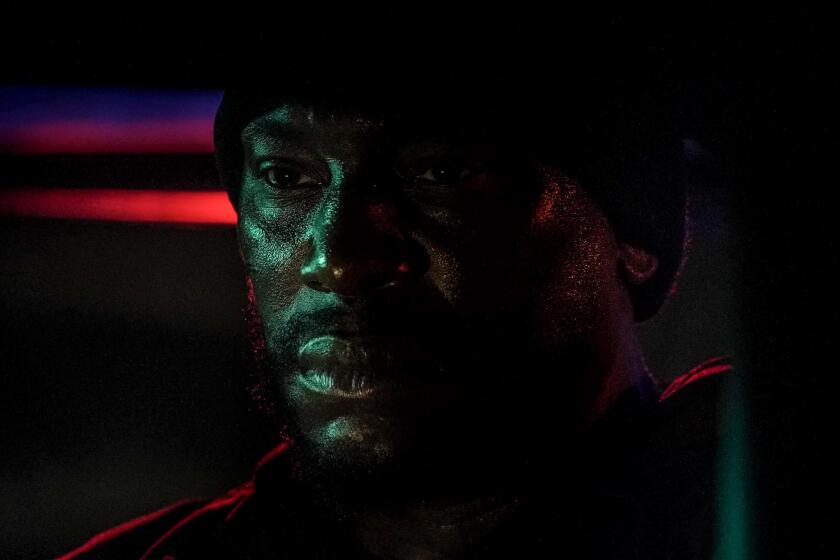‘Va Savoir’s’ Love Lives Are Magically Tangled
“Va Savoir” offers many pleasures, but none so rare or satisfying as the chance to watch a film find itself. For this masterful celebration starts off slowly, even uncertainly, giving no hint of the rich and elegant exploration of love, jealousy and animal attraction it will in all good time become.
If that final phrase sounds a bit Shakespearean, it should. Though quintessentially French (it takes place during a week in Paris), by its close “Va Savoir” has the unmistakable feeling of one of the playwright’s irresistible multi-character romantic comedies, grounded in preposterous coincidence and silly contrivance but finally elevated from farce to transcendence by an overarching spirit of warmth, complicity and compassion.
It’s not surprising that the director who devised this confection is 73--this kind of casual proficiency often comes with age--but having an accessible film at a relatively manageable length from French New Wave pioneer Jacques Rivette is a departure.
Speaking at Cannes, where the film was rapturously received but, inevitably, denied awards because of its openness and joy, Rivette explained that he worked here the way he has for decades: employing a methodthat allows his actors greater range and his characters a depth and complexity that’s absent from more ordinary films.
Working with frequent collaborators Pascal Bonitzer and Christine Laurent, Rivette came up with a 15-page outline setting out in broad strokes “Va Savoir’s” story of the delicious complications that result when three men and three women tangle up their romantic lives, bouncing off each other like molecules, combining and recombining, attracting and resisting. “The details,” the director explained, “are all filled in as the actors take possession of their roles.”
The technique, at least in Rivette’s hands, allows characters to become richer, more indisputably themselves. It makes it easier to be drawn into their lives, to sink fully into their quests and their uncertainties.
Because they are so well-grounded, there’s no problem following them into circumstances that mock the bounds of plausibility.
“Va Savoir” begins simply enough, with a French actress named Camille (Jeanne Balibar) who is returning to Paris after an absence of three years for a one-week engagement of a play by Pirandello. She’s now the star of an Italian theater troupe and in a relationship with Ugo (Sergio Castellitto), her director, co-star and the group’s leader.
Far from being happy to be back in her former home, Camille is tense, distraught, an emotional dishrag. She doesn’t know whether she should contact her ex, Pierre (Jacques Bonnaffe), a self-important professor of philosophy working on a thesis with the not very promising title, “Heidegger, the pre-Socratic to the new German thought.”
Camille’s dithering, which involves a lot of self-dramatizing and talking to herself, does not get “Va Savoir” off to a promising start. It’s the film’s least involving segment, a textbook example of unsuccessful improvisation. Not to worry. Once Camille and Pierre do meet, the film, and not for the last time, sets off in promising new directions.
For one thing, Pierre has got an attractive new girlfriend named Sonia (Marianne Basler), a lithe ballet teacher with a mysterious past. And he hasn’t gotten over his attraction to Camille.
Ugo, meanwhile, is pursing an old love of his own. It’s not a person, but rather an unpublished, possibly apocryphal play by the 18th century Italian dramatist Goldoni. If this piece, written in Paris and possibly still lurking in some private library, actually exists, it’s Ugo’s dream to be the first to direct it. Ugo’s search takes him to a fastidious autograph dealer (an amusing cameo by producer-director Claude Berri) and a fusty archive, where a striking graduate student named Dominique, Do for short (Helene De Fougerolles), takes pity on his lack of facility with library protocol. An attraction forms between these two almost immediately, something that does not please Do’s brooding half-brother, Arthur (Bruno Todeschini), a solitary gambler in constant need of money. Once everyone is introduced, the complications begin in earnest.
“Va Savoir” translates as “who knows,” to which the film answers, “no one and everyone.” As in Shakespeare, all parties end up where they belong, but Rivette and company are particularly adroit at keeping the particulars of that destination a mystery. Characters change, recede, increase and decrease in importance, in a way that feels like magic. We’re never really sure where things are headed, and we’re never completely right in our guesses. “Va Savoir” takes its time showing its hand, but that is the source of its satisfactions, and its charm.
*
MPAA rating: PG-13, for brief nudity. Times guidelines: adult subject matter.
‘Va Savoir’
Jeanne Balibar: Camille
Sergio Castellitto: Ugo
Marianne Basler: Sonia
Jacques Bonnaffe: Pierre
Helene De Fougerolles: Do
Bruno Todeschini: Arthur
A Pierre Grise Productions, France 2Cinema, VM Productions, Mikado Films, Kinowelt production, with participation from Canal Plus, Cofimage 12, Gimages 4, Centre National de la Cinematographie and support from Eurimages, Procirep, released by Sony Pictures Classics. Director Jacques Rivette. Producer Martine Marignac. Screenplay Pascal Bonitzer, Christine Laurent, Jacques Rivette. Cinematographer William Lubtchansky. Editor Nicole Lubtchansky. Costumes Laurence Struz, Christine Laurent. Set design Manu de Chauvigny. Running Time: 2 hours, 30 minutes.
In limited release.
More to Read
Only good movies
Get the Indie Focus newsletter, Mark Olsen's weekly guide to the world of cinema.
You may occasionally receive promotional content from the Los Angeles Times.










